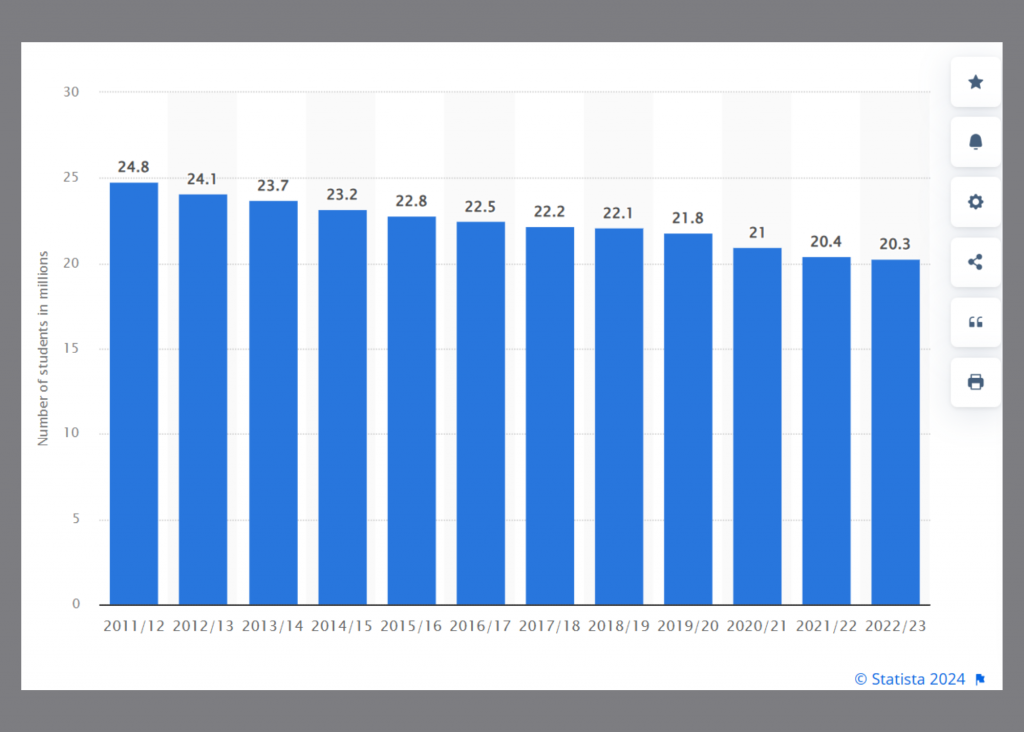For over a decade, graduate degree programs have been a cash cow for colleges and universities. Between 2010 and 2021, overall enrollments in graduate school programs grew by a robust 9%; this, as undergrad enrollment plummeted 15%.[1]
But even though graduate program enrollments have been quite strong, and have been a godsend for struggling institutions, we may soon be entering a time of softer, flatlining enrollments, or worse, a full-on decline.
Now, while there are a number of factors that are pointing to this potential decline (and at least one major factor that may rebuff it), there are solutions that institutions who are offering fully online master’s degree programs could utilize to help buck the potential of this trend; solutions which we, Conversion Media Group, will discuss momentarily.
First, as noted above, there was a 15% decrease in undergrad enrollment between 2010 and 2021. Many have called this the great college brain-drain.

Now, with a “demographic cliff” expected to begin effecting future enrollments (beginning next year), combined with fewer high school students “wanting” to attend undergrad programs…
The pool of qualified master’s degree candidates is likely to shrink. It’s simple math.
However, if history is any indication, an economic phenomenon may rebuff this. You see a weakening economy could help bolster not only enrollments in graduate programs, but also undergrad programs as well.
We’ve discussed this phenomenon, called countercyclical demand, in previous articles. So, rather than rehashing it in full, here’s a quick synopsis: When the economy is softening, or is in recession, college enrollments generally increase. Why? The population is looking to gain the skills to better their chances at gainful employment in a weakening labor market. And typically, those skills come from a college education.
During the great recession, for example, enrollments grew by 33% between 2006 and 2011.
Now, while recession is no long-term cure for enrollment issues, it has been shown that master’s candidates will enroll at higher rates, should they feel an economic pinch. But is there a pinch?
Since the pandemic, our economy has been mostly on a roll. As a result, many qualified candidates have been choosing lower-cost, shorter-term certificate programs over grad school to help bolster their careers.
But…
According to economists at JP Morgan, the probability of a recession in 2025 is now 45%.[3] Meaning we could see, beginning sometime late next year, countercyclical demand cause somewhat of a rebound in grad school enrollments.
But work must be put in now to ensure your institution reaches its spring 2025 enrollment goals. You can’t simply wait for students to find you.
As Doug Shapiro, executive research director of the National Student Clearinghouse Research Center, pointed out, ““When the reality sets in that they’re [prospective students] not going to find another job, then they start thinking about school.
“And by the time they get through the whole process of finding a school and getting into a school, a year and a half to two years has gone by.”
So…
If your school is targeting the “cash cow” graduate students, and is offering degree programs fully online, now is the time to begin marketing to them. You don’t want to wait a year and a half to two years for them to come to you…
When you can reach them now!
And perhaps the best way to reach potential grad students is by partnering with Conversion Media Group, a nationwide leader in online graduate school enrollment initiatives.
Education is our business too.
For information on how Conversion Media Group can help you increase online grad student enrollments at your institution, simply visit us HERE…
Or call 1-800-419-3201 and one of our enrollment experts will explain precisely what we can do for you.
[1] COE – Postbaccalaureate Enrollment (ed.gov)
[2] Undergraduate enrollment in U.S. universities 2023 | Statista
[3] What Is the Probability of a Recession? | J.P. Morgan Research (jpmorgan.com)

